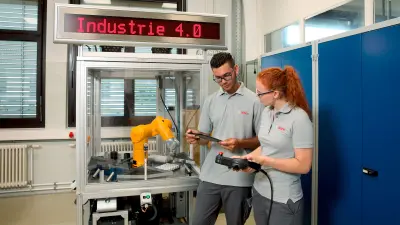Work 4.0 — Actively shaping training programs
In dialogue with the Secretary General of Plattform Industrie 4.0

Industry 4.0 is changing the way we work. We therefore need to change the way we learn and what we learn about, says Henning Banthien. This won’t be easy, but it will be worthwhile. Ideally, he believes, schools, universities and businesses should design new training and development programs together.
Future demands
Changes brought about by Industry 4.0 and the digital revolution in general are taking place at varying rates and levels of intensity depending on the business in question, explains Henning Banthien, Secretary General of Plattform Industrie 4.0. There is no one big challenge, and likewise no “one size fits all” solution. Nevertheless, a certain basic pattern in requirements can be detected, he believes: “The lines between the various disciplines are becoming blurred. Software knowledge is becoming increasingly important as a whole”, summarizes the futures expert. “Furthermore, workers in charge of controlling machines now increasingly need to consider the production process in its entirety. They need to understand the processes so that they can respond to problems with ‘agility’”. Methods of collaboration are also changing. Development processes in particular call for teamwork and strong communication, rather than lone warriors, Banthien explains.
“Digital transformation has its challenges but it also opens up new scope for change and opportunities for influence.”
Train! Now!

According to Banthien, we should take a two-pronged approach to training in the future. On the one hand, it is necessary to think for the long term and start getting training programs ready to tackle the needs of not just tomorrow but also the day after tomorrow. Media skills and programming should be promoted in schools, for instance. However, to do this, teachers need to be trained in these areas, which is why basic training in digital solutions and IT should be made a mandatory component of our training and professional development programs for teachers. On the other hand, we can’t forget that there are already millions of people working in businesses. “They have completed their basic vocational training but still have a long working life ahead of them. We must not forget about such people. Instead, we should incorporate them into a new culture of lifelong learning and provide them with practical professional development measures”, Banthien emphasizes. Digital transformation in companies is creating new challenges for staff, HR departments, trade unions and works councils, but at the same time it is opening up new scope for change and opportunities to influence the future of the company. Banthien recommends that these stakeholders “seize this opportunity”.
The global leader in dual vocational training
On an international scale, Germany comes out pretty well, says Banthien. The dual training system in particular is attracting a great deal of attention. There are three aspects that make this system so unique. Number one: theory and practice are closely intertwined. This makes sense from a didactic point of view and ensures the content is relevant to application. Number two: the training bodies leave scope for special training requirements within companies. Banthien explains that businesses with successful training programs tend to use this scope when creating dual training programs for their companies. Number three: dual training programs are the result of social partnership. Employer and employee representatives work together to agree what is best for everyone. “While this dual concept may be a pioneering model on the global stage, the subject of training is significantly broader”, Banthien adds. “This is why, in the fields of retraining and professional development in particular, we are on the lookout for international dialog and are keen to learn from other countries.”
Henning Banthien — Secretary General of Plattform Industrie 4.0

Henning Banthien is the Secretary General of Plattform Industrie 4.0 and head of this agency. After studying philosophy and geography, he has gone on to become an expert in the fields of Industry 4.0, sustainability, academic communication and innovation. He is also a managing partner at IFOK GmbH. Mr Banthien is also a member of the VDI Technical Committee for Technology and Society and has many years of experience in sustainability strategies.
Summary
According to Henning Banthien, Industry 4.0 and the digital revolution call for specially trained employees. Training and professional development measures in schools and businesses need to be adapted accordingly. Germany is well equipped with its dual training system.